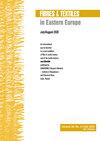含百里香和茶树精油的铬鞣成品革的抑菌活性
IF 0.9
4区 工程技术
Q3 MATERIALS SCIENCE, TEXTILES
引用次数: 0
摘要
摘要皮革制品为微生物生长提供了理想的环境。为了防止各种类型微生物的出现和传播,使用选定的杀生物剂甚至精油对其进行处理。本论文的目的是研究所选精油在用于皮革高档产品的铬鞣皮革上的抗真菌活性。根据PN-EN 14119:2005标准评估抗真菌活性。测试了四种铬鞣皮革成品,每种皮革都浸泡在以下精油中:浓度为1%、2%和5%的茶树精油和浓度为1%和5%的百里香精油。结果表明,百里香精油皮革涂饰剂对黑曲霉、球毛霉菌和白色念珠菌具有抗菌活性。在皮革样品中应用5%百里香精油抑制了所有测试菌株的生长。在皮革样品上使用茶树精油仅对白色念珠菌具有抗菌作用。精油在皮革涂饰过程中的应用可能是制革工业中使用的杀生物剂的替代品。本文章由计算机程序翻译,如有差异,请以英文原文为准。
Antifungal Activity of Finished Chromium Tanned Leather Containing Thyme and Tea Tree Essential Oils
Abstract Leather products provide an ideal environment for microbial growth. In order to prevent the appearance and spread of various types of microorganisms, it is treated with selected biocides and even essential oils. The aim of this paper was to investigate the antifungal activity of selected essential oils applied to finished chromium tanned leather which is intended for leather fancy products. Antifungal activity was evaluated according to the PN-EN 14119: 2005 standard. Four finished chromium tanned leathers were tested, each of which was soaked in the following essential oils: tea tree essential oil at a concentration of 1, 2 and 5% and thyme essential oil at concentration of 1, 2 and 5%. The results obtained indicated that leather finishing with thyme essential oil showed the antimicrobial activity against Aspergillus niger, Chaetomium globosum and Candida albicans strains. The application of 5% thyme essential oil to leather samples inhibited the growth of all strains tested. Using tea tree essential oil on leather samples showed a antimicrobial effect only against Candida albicans. The application of essential oils in the leather finishing process may be an alternative to biocides used in the tanning industry.
求助全文
通过发布文献求助,成功后即可免费获取论文全文。
去求助
来源期刊

Fibres & Textiles in Eastern Europe
工程技术-材料科学:纺织
CiteScore
1.60
自引率
11.10%
发文量
12
审稿时长
13.5 months
期刊介绍:
FIBRES & TEXTILES in Eastern Europe is a peer reviewed bimonthly scientific journal devoted to current problems of fibre, textile and fibrous products’ science as well as general economic problems of textile industry worldwide. The content of the journal is available online as free open access.
FIBRES & TEXTILES in Eastern Europe constitutes a forum for the exchange of information and the establishment of mutual contact for cooperation between scientific centres, as well as between science and industry.
 求助内容:
求助内容: 应助结果提醒方式:
应助结果提醒方式:


